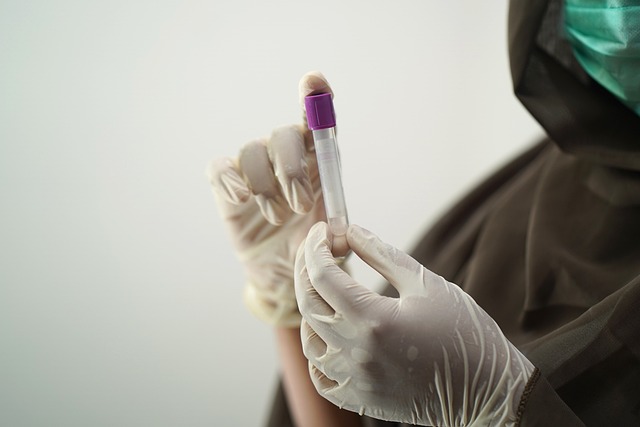The UK Kidney Blood Test is a vital diagnostic tool for assessing Vitamin B12 levels as part of a comprehensive nutritional health evaluation. It's particularly useful for detecting B12 deficiencies, which can cause anemia, fatigue, memory loss, and neurological problems. This test, which measures B12 in the bloodstream, is essential for informing treatment plans that may include dietary changes or supplements, both oral and injectable. It's also important to note that CMV, a common virus, can present with a wide range of symptoms, from mild to severe, and poses high risks to newborns and those with weakened immune systems. Regular follow-up tests post-treatment are crucial to ensure B12 levels remain within the standard reference range of 200-914 pg/mL in the UK, and to maintain overall health. For individuals diagnosed with Vitamin B12 deficiency, managing this condition is essential for safeguarding kidney health, which can be compromised by both deficiencies and high levels of B12. In the UK, healthcare professionals emphasize personalized medical advice and careful treatment planning that considers dietary changes and supplementation, all while monitoring kidney function and B12 levels to prevent complications or further deficiencies. This comprehensive approach to managing B12 deficiency with the UK Kidney Blood Test underscores its importance in the healthcare system for maintaining patient well-being and preventing kidney health issues.
Vitamin B12 is an indispensable nutrient, pivotal for maintaining optimal health, particularly within the UK’s population. Its deficiency can lead to a spectrum of health issues, including impaired kidney function. Recognizing and addressing this deficiency hinges on accurate testing via UK Kidney Blood Tests, which provide critical insights into one’s B12 levels and overall wellbeing. This article delves into the intricacies of B12 deficiency detection through blood tests, offering a comprehensive guide to understanding, interpreting, and managing test results within the UK healthcare system. Understanding the process and post-testing actions is key to safeguarding kidney health and overall vitality.
- Understanding Vitamin B12 Deficiency: The Role of UK Kidney Blood Tests
- The Process and Interpretation of Vitamin B12 Blood Test Results in the UK
- Post-Testing Actions: Managing Vitamin B12 Deficiency and Kidney Health in the UK Context
Understanding Vitamin B12 Deficiency: The Role of UK Kidney Blood Tests

Cytomegalovirus (CMV) is a common virus that can cause symptoms ranging from mild to severe, depending on the age and health status of the individual. For newborns and people with weakened immune systems, a CMV infection can be particularly concerning. Understanding the nature of CMV and its potential impact on health is crucial for effective prevention strategies and informed decision-making regarding treatment options.
In the UK, healthcare providers often utilize kidney blood tests to assess Vitamin B12 levels as part of a comprehensive approach to understanding nutritional status and identifying potential deficiencies. These tests are pivotal in diagnosing B12 deficiency, which can manifest in various symptoms including anemia, fatigue, memory loss, and neurological issues. The UK kidney blood test measures the amount of Vitamin B12 present in the bloodstream, providing a clear indication of whether an individual’s levels are within the normal range or if a deficiency is present. This information enables healthcare professionals to tailor treatment plans accordingly, which may include dietary changes, oral supplementation, or, in more severe cases, injection therapy. Regular monitoring of B12 levels post-treatment ensures that the deficiency is adequately addressed and that the individual’s health is preserved. The UK kidney blood test thus plays a vital role in the early detection and management of Vitamin B12 deficiencies, contributing to the overall well-being of patients.
The Process and Interpretation of Vitamin B12 Blood Test Results in the UK

In the UK, Vitamin B12 deficiency can be reliably diagnosed through a simple blood test, which is readily available in primary care settings and hospitals nationwide. The process commences with drawing a sample of blood from a vein in the patient’s arm. This sample is then sent to a certified laboratory for analysis. The UK Kidney Blood Test often includes B12 levels as part of its panel because kidney function and B12 absorption are interlinked; adequate kidney health is necessary for the body to absorb and utilise this vitamin effectively.
The interpretation of Vitamin B12 blood test results in the UK follows a standardised protocol. A healthcare provider will assess the level of B12 present in picograms per millilitre (pg/mL). The reference range for B12 levels is typically 200-914 pg/mL. A level below 200 pg/mL indicates a deficiency, which may be associated with anaemia and neurological symptoms. Additionally, if the results show borderline levels or if there is clinical suspicion of B12 deficiency despite normal levels, further tests such as methylmalonic acid (MMA) and homocysteine might be ordered to confirm the diagnosis and guide treatment. It’s important for individuals to discuss their test results with a healthcare professional who can provide personalised advice and treatment options if a deficiency is present.
Post-Testing Actions: Managing Vitamin B12 Deficiency and Kidney Health in the UK Context

In the UK, post-testing actions for individuals who have undergone a blood test revealing Vitamin B12 deficiency are critical for effective management and maintaining kidney health. Upon receiving a diagnosis of low Vitamin B12 levels, it is imperative to consult with a healthcare professional. They will tailor a treatment plan that may include dietary modifications to increase B12 intake from natural sources such as meat, fish, dairy products, and fortified cereals. For those with kidney issues or conditions like anaemia, which can also affect kidney function, managing B12 levels is particularly important. The kidneys are responsible for regulating electrolytes and ensuring that the body’s balance of fluids is maintained; therefore, any treatment plan must consider this delicate equilibrium. In cases where dietary adjustments alone are insufficient, B12 supplementation may be prescribed. This should be done under medical supervision, especially in the UK context, as supplement doses need to be carefully monitored to avoid adverse effects on kidney function. Regular follow-up appointments and periodic blood tests are essential to monitor both Vitamin B12 levels and kidney health, ensuring that treatment is effective and adjustments are made as necessary to avoid complications or further deficiencies.
In conclusion, vitamin B12 deficiency is a condition that can significantly impact one’s health, and understanding its detection through UK kidney blood tests is paramount. This article has outlined the critical role these tests play in diagnosing this deficiency. The process of interpreting blood test results in the UK is systematic and precise, ensuring accurate assessments of B12 levels. Following a confirmed deficiency, timely management and support for kidney health are essential steps to restore well-being. For those in the UK experiencing symptoms that may indicate vitamin B12 deficiency, it is advisable to consult healthcare professionals and undergo a kidney blood test as part of a comprehensive diagnostic approach. Regular monitoring and appropriate treatment can effectively manage this condition and prevent related complications, thereby maintaining overall health and quality of life.
